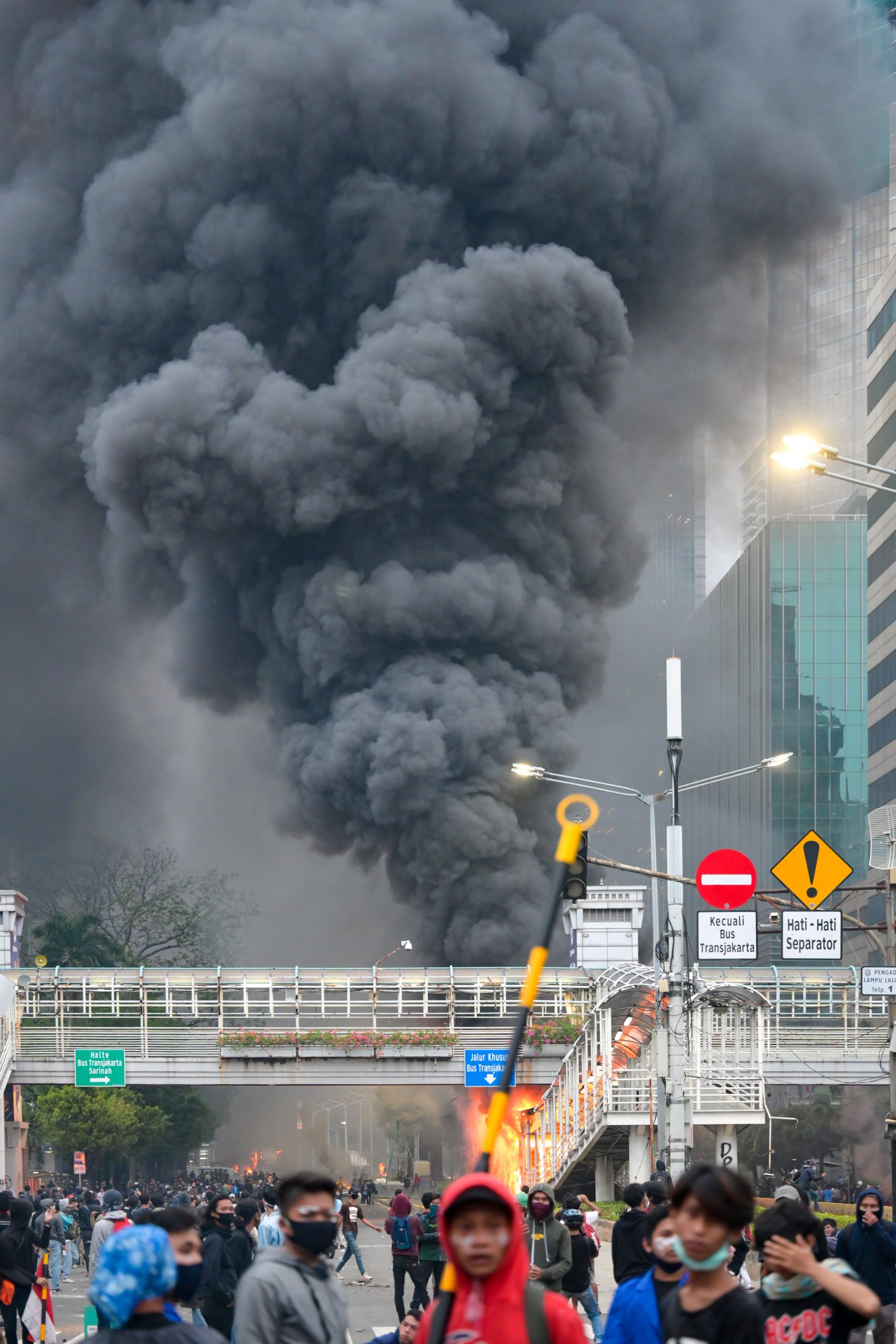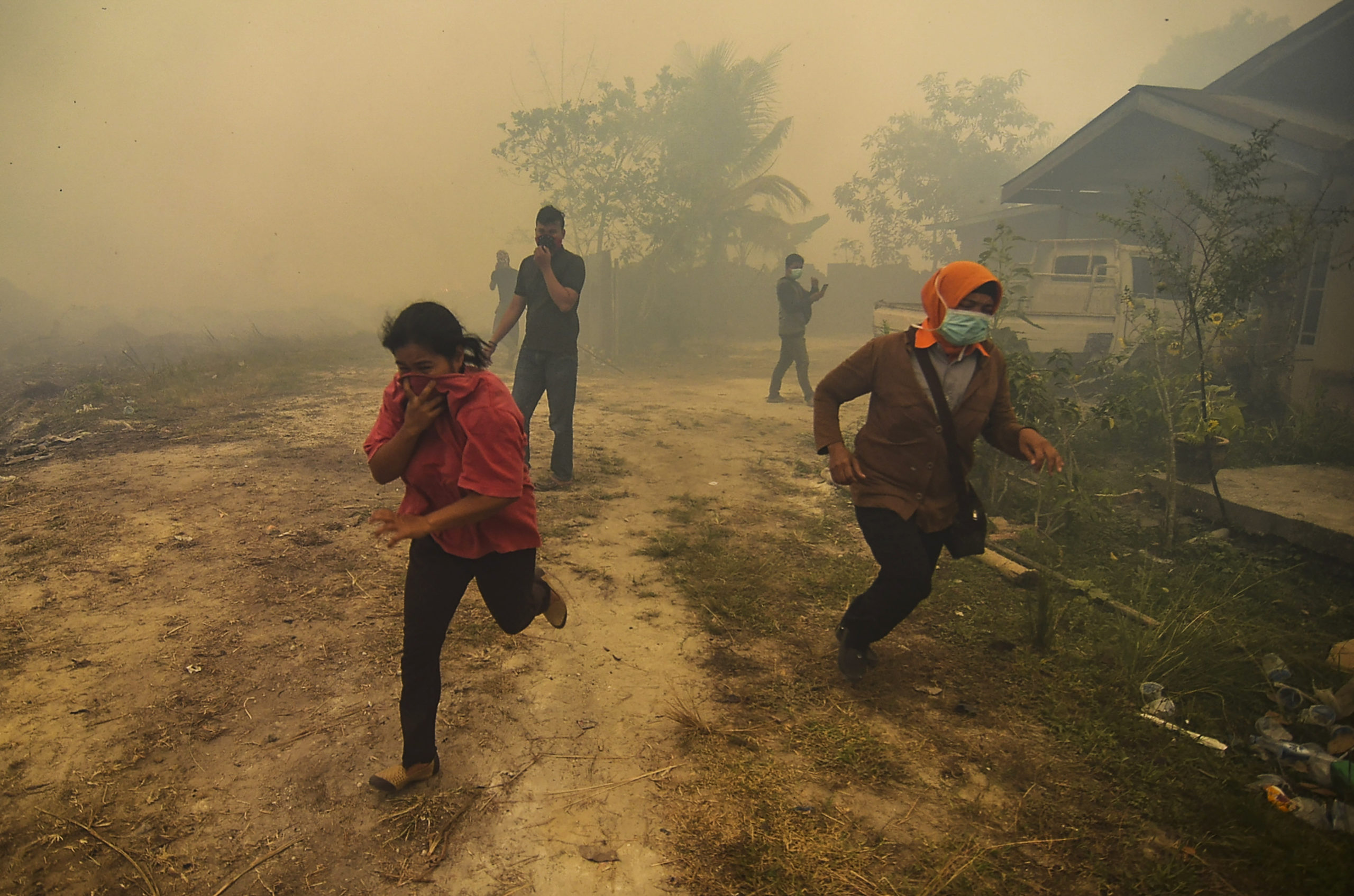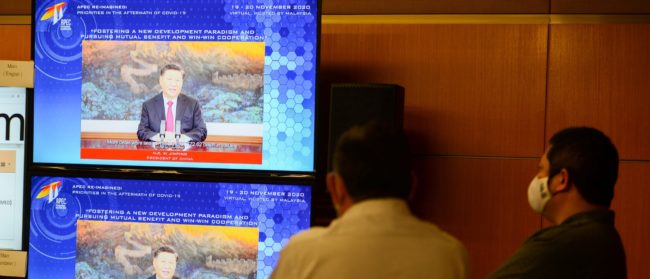Around this time last year Indonesians, Singaporeans and Malaysians had little choice but to don face masks, months before Covid-19 had even hit their shores.
A thick haze had blanketed the region as, once again, Indonesia battled a severe fire season, with 1.65 million hectares of peatland burning across densely forested islands Sumatra and Kalimantan. This year, despite experts forecasting a milder fire season in Indonesia compared to 2019, more than 700 fires have raged across Central Kalimantan, Indonesia’s third-largest and palm-oil rich province, a reminder of the sustained risks posed by the lucrative palm-oil industry and the complexities of sustainable land management in Indonesia.
Behind the haze, the stakes are even higher this year. The pandemic combined with the recently passed Omnibus Law highlight some alarming trajectories in how Jakarta seeks to mitigate mounting disasters, with more connecting Covid-19 and Indonesia’s fire struggles than first meets the eye.
First, the health impacts of exposure to air pollution are increasingly understood to heighten vulnerability to coronavirus. Many of the pre-existing conditions that prove problematic for Covid-19 patients, such as chronic lung conditions like asthma, are caused or worsened by forest and peatland fires, particularly when the pollution reaches dangerous levels of PM2.5 as they have in recent years.
What’s more, the Indonesian Paediatrician Association has linked among the world’s highest child Covid-19 death rates with the poor health already prevalent amongst Indonesian children, particularly in fire-prone areas of Sumatra and Kalimantan.
Second, ongoing mitigation efforts such as ground patrols, inspections, and community engagement with farmers and oil-palm growers have been recognised by President Joko “Jokowi” Widodo as crucial for reducing the risks and likelihood of these fires. However, such prevention and preparedness efforts for the 2020 fire season have been largely restrained due to the logistical and budgetary challenges resulting from the pandemic.
This crucial deficit, coupled with the economic fallout forcing some rural communities to seek alternative sources of income, has seen greater rates of illegal logging and land clearing, with forest loss rising 50% in the first 20 weeks of 2020 compared with the same period in 2019. This further exacerbates unsafe clearing practices and the likelihood of fires.
Addressing forest and peatland fires is in Jokowi’s best interest politically, not just for the environmental and health pressures, but the strains it puts on relations with Malaysia and Singapore
Heavily criticised for apathy towards mitigating these disasters, Jokowi’s government is failing to hold the palm-oil sector to account for their considerable responsibility in causing fires over the years, with the industry acting with relative impunity. Addressing forest and peatland fires is in Jokowi’s best interest politically, not just for the environmental and health pressures, but the strains it puts on relations with neighbours Malaysia and Singapore.
Despite the threat these fires cause to the environment, public health and Indonesia’s international relations, the highly controversial Omnibus Law successfully passed through the Indonesian Parliament in October. This spread of amendments to 73 laws, drafted hastily and in unashamed absence of public consultation and heeding of expert advice, includes significantly diminishing environmental safeguards. It will pull Indonesia even further away from international standards of best practice for land and natural asset management.

The bill weakens liability for environmental crimes, absolving palm-oil and pulp sectors of responsibility for their prior damage to Indonesia’s peatlands. Specifically, with environmental protection and spatial planning laws diluted, fewer businesses will have to pass an environmental impact assessment and fewer permits will be required, giving corrupt logging, mining and plantation operations a leg up.
The vision Jokowi’s administration has for this Omnibus Law begs the question of how seriously Indonesian forest and peatland fires are taken as environmental, public health and international relations crises. Particularly concerning is its direct contradiction with the government’s ‘Green Growth’ agenda, led by the Ministry of National Development Planning. A law reportedly intended to create jobs and support Indonesia’s economic recovery following the pandemic, it seems the ‘green growth principles’ intended to dovetail economic growth with environmental sustainability and risk reduction no longer apply with the Omnibus Law.
But at the same time that Indonesia’s Omnibus Law was passed in mid-October, a parallel regional agreement was made. The Landscape Partnership for Asia was signed by land and forestry organisations across Asia in an attempt to strengthen and unify efforts to protect forests and other natural assets in the region, particularly against climate change impacts such as drought and fires. While the Landscape Partnership symbolises cautious optimism for the future of forestry in the Asia-Pacific, for Indonesia, it is vastly overshadowed by the passing of the Omnibus Law and its long-term ramifications.
With the limitations in disaster preparedness already caused by the pandemic this year, enforcing other regulatory measures to better manage land clearing and drying in forests and peatland areas is integral to avoiding a mounting environmental, health and political crises. Holding the palm-oil industry to account and genuinely prioritising the public health of tens of millions of people across Indonesia, Malaysia and Singapore must take precedence in decision-making and policy.
There’s too much at stake in undermining this through the sweeping legal changes encompassed in the Omnibus Law.
Rebekah Baynard-Smith is the Indo-Pacific Fellow for Young Australians in International Affairs. This piece was originally published on Insights and republished with the permission of YAIA.


